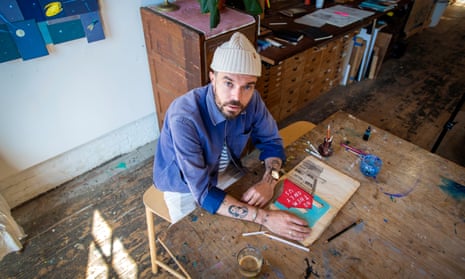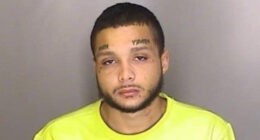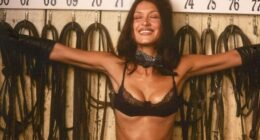Oliver Jeffers grew up in Belfast hating violence. Now he wants children to see how futile it is

Oliver Jeffers doesn’t just hate conflict. He abhors it. And that is why the prize-winning children’s author and illustrator, who grew up in Belfast during the Troubles, thinks parents have a responsibility to teach their children about it. “Children are future adults. I think if we walk on eggshells or tiptoe around subjects – tell them ‘everything is perfect, life is rosy’ – people will walk into the same failures that humans have been making for time eternal,” he says.
Parents need to find a way to talk to their children about war and other types of political and social conflict, he says. “I think it’s their responsibility to do that. But from the perspective of: conflict doesn’t accomplish very much.”
Jeffers is hoping his latest beautifully illustrated picture book, Meanwhile Back on Earth, will trigger conversations about this, by offering children a “cosmic view on conflict”.
In the book, a father turns his family vehicle into a “space car” and takes his two children – who are fighting in the back seat – on a tour of the solar system, to give them some perspective on the conflicts that have taken place on Earth since the beginning of time.
The aim is to show children how territorial disputes would seem, from space, as inconsequential and pointless as kids fighting in the back of a car. It was partly inspired by something the Apollo 14 astronaut Edgar Mitchell famously said in 1974: “From out there on the moon, international politics look so petty. You want to grab a politician by the scruff of the neck and drag him a quarter of a million miles out and say, ‘Look at that, you son of a bitch.’”
Jeffers, who illustrated The Day the Crayons Quit and won the Nestlé Smarties Book Prize in 2005 for Lost and Found, underwent a similar “cognitive shift” when he moved from Belfast to New York. He lived there for 17 years and had to keep explaining to people, who assumed he was Irish, that Northern Ireland was part of the UK. “And they’d go: ‘What?’ These were very smart, educated people, who didn’t fully understand that Northern Ireland was separate from the Republic of Ireland, and was actually part of the same country as Great Britain. And then, when Brexit happened, I realised that a lot of English and Welsh people didn’t realise that either.”
This naturally astonished Jeffers, who had grown up in the 1980s and 1990s “very used to the sight of the British army in full battle gear boarding a bus and checking it for bombs”.
His older brother was beaten up because he was Catholic. “I got away,” he says. Fireworks were shot at his home. Catholic friends were “targeted” and “are no longer alive. I learned to avoid trouble and talk my way out of trouble.” He views the fighting that took place as a “tragic, poignant waste of energy”. “Even at the time, I realised that I abhorred conflict. It made me physically sick, the idea of violence.”
Yet when he left Northern Ireland, he discovered this huge conflict that had overshadowed his childhood mattered very little to most people he met. “I remember recognising, when I moved to New York, that having a Northern Irish accent was an asset for the first time, not a hindrance.”
Jeffers found writing the book “extremely cathartic” and is hoping children, especially “squabbling siblings”, will read it and question what conflict can achieve. “I realised that at any point in human history, there was always some conflict taking place about territory and physical space. And that is something that children can understand – especially when applied to the back seat of the car. ‘This is my side, that’s your side, don’t look out my window.’”
The book was born out of conversations he had with his seven-year-old son and four-year-old daughter, in the car, including one fascinating discussion about how long it would take to drive between the planets in our solar system. With the help of an astrophysicist, he discovered it would take 283 years to travel to the sun at 37mph – which, he says, is the average speed humans drive at – while it would take 8,000 years to reach Neptune.
For all that time, the book shows, back on Earth, humans have been fighting each other over bits of land and Jeffers is hoping his readers will see, as Mitchell did, just how tragic and senseless this is.
READ RELATED: LifeStraw Personal Water Filters Are on Major Sale For Amazon Prime Day October 2022
Parents can also use the book to talk to their children about the importance of gaining a sense of perspective on conflicts in their own lives, with a view to helping them to resolve petty disputes with friends or siblings.
“Perspective can come from time or distance. When you take a deep breath, when you count to 10, you calm down because that gives you the perspective of time. And, whenever you get physically far enough away, that battle doesn’t seem so important any more. With physical distance, your perspective can totally shift.”
Jeffers was reminded of this himself during lockdown. “I was getting worked up and frustrated, being stuck in a place I didn’t want to be.” He decided to take his kids out for a drive, to give his wife some space. “Looking at their faces in the back of the car, I suddenly had this perspective shift: what am I doing? Why am I getting frustrated and worked up here?”
He has not shied away from speaking to his own children about the conflicts that currently exist in the world, including the violence and political unrest in Northern Ireland. “We’ve talked to them about why these things are happening. And we have a Ukrainian refugee living with us and so we’ve talked to them about why there is a battle in Ukraine right now.” This has not prevented his son from taking a Barbie doll, bending it in half and turning it into a gun. “I think there’s just something in little boys that makes them like that.”
But he is trying his best to ensure his children grow up knowing “this is what conflict does. And placing that in the perspective of life at large. What is the life that you want to live?” Other questions he asks them include: “What is accomplished by conflict? What do you learn from that?”
It was only when he became a father himself that he realised he had a responsibility to address these issues, not only with his children but also in his work. “My dad is a teacher and he always felt very frustrated by the western education system – he used to say that the two most difficult things a human being ever learns how to do is how to walk and how to talk. Yet from day one at school, you’re taught to sit down and shut up. But if you think about what we actually need to be teaching children, which is how to be a contributing member of society, then there are really only two things that you need to teach them: empathy and curiosity.”
He recently realised how much, as an artist, he has been deeply influenced by the murals he grew up around, that were famously created by groups on both sides of the conflict in Belfast. “The murals of both sides are very prevalent throughout the city but it took someone else to point out the impact on my work. Both the graphic nature of militant loyalist murals and the folksy whimsical nature of the nationalist murals are very present in my work.”
As an artist who has witnessed the consequences of conflict, he thinks it is important to speak out and try to make a difference. “There’s a famous book about Northern Ireland, which is called Say Nothing. The idea is, for your own safety, you just say nothing. But I’ve realised that I have a language, with my art, that means I can talk about some of these issues and get access to the mindsets of people I might not otherwise. There’s a responsibility and there’s a power in being able to make art that communicates with everybody, even children.”
The subtle message of the book is: instead of spending time and energy fighting with other people “over something that doesn’t really matter, in terms of the survival of civilisation”, human beings need to unite and redirect their energy into protecting life on earth. “The ‘them and us’ mentality is so dangerous.”
He fears that weather changes and temperature shifts will one day make Earth uninhabitable. “That is our greatest enemy right now. That is what needs to be fought. But we’re too distracted to do that, to rally around, against our common enemy.”
Like his earlier book, Here We Are: Notes for Living on Planet Earth – named book of the year by Time magazine and turned into an Emmy-award winning animated film – Meanwhile Back on Earth celebrates how precious our planet is and emphasises to children that it is humanity’s only home. “We are fascinated with the rest of the universe. But it’s this place that matters. It’s this place that’s home. And that needs to be looked after more than anything else.”
Meanwhile Back on Earth by Oliver Jeffers is published by HarperCollins at 16.99. Buy a copy for £14.78 from guardianbookshop.com
Source: Health & wellbeing | The Guardian




